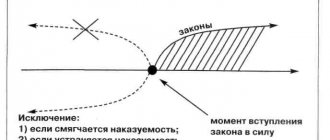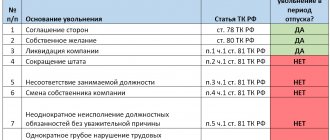24.10.2019
0
1047
4 min.
Relations between the parties are regulated by an employment contract; it is in this document that the important conditions and features of the work that the citizen will perform must be fully spelled out. Particular attention is paid to the specifics of the activity, the duration of the shifts, the number of days off and wages. But in addition to this, it is necessary to specify the nature of the work. It comes in different types, which affects the required allowances and compensation.
TYPES OF NATURE OF WORK IN AN EMPLOYMENT CONTRACT
Thus, given the ambiguity of the legislator’s position in determining the types of work, the conclusion suggests itself that the worker and the employer must decide for themselves what nature of the work to establish in the contract.
Of course, taking into account the above acts. In addition, the conditions defining the nature of the work must necessarily include an employment contract.
This does not mean that if the conditions are not specified, then such an agreement will not be considered concluded. However, in the event of an inspection, the employing company will face fines for violating labor laws. The director may even be disqualified for this.
Finding the Right Direction
How to determine what the nature of work is and what it is in an employment contract, you need to familiarize yourself with Article 57 of the Labor Code. Service character is the conditions that determine it.
Nature of work - what types there are:
- traveling;
- mobile;
- on my way;
- another.
Compensation
Article 168-aya.1 of the Labor Code states:
“The employer must pay compensation to service representatives with traveling uniforms for expenses associated with business trips, confirmed by relevant certificates (not including daily allowances). Otherwise, payment will not be made."
For example, this type of work requires a driver to have receipts for gasoline, and in the event of a breakdown on the road, a receipt from a car service center. In the absence of such, the employer has the right to refuse payment of compensation.
Another option for paying compensation for travel is also possible. The worker does not need confirmation of expenses; he can only indicate in the contract a fixed allowance provided for by internal documentation.
CONDITIONS DETERMINING THE NATURE OF WORK IN AN EMPLOYMENT CONTRACT
In paragraph 8, part 2, article 57 of the Labor Code of the Russian Federation, among the mandatory conditions, a condition is named that determines, in necessary cases, the nature of the work (mobile, traveling, on the road, other nature of the work). It should be noted that the previous version of Article 57 of the Labor Code of the Russian Federation did not provide for such a condition either as an essential or as an additional condition of the employment contract.
The above types of work correspond to conditions that provide for the provision of certain guarantees and compensation, in particular those provided for in Art. 168.1 Labor Code of the Russian Federation. According to its provisions, employees whose permanent work is carried out on the road or have a traveling nature, as well as employees working in the field or participating in expeditionary work, are reimbursed by the employer for travel expenses associated with business trips; expenses for renting residential premises; additional expenses associated with living outside the place of permanent residence (daily allowance, field allowance); other expenses incurred by employees with the permission of the employer.
General provisions
In resolving disputes related to labor activity, it is necessary to use exclusively the provisions of the law, namely the Labor Code of the Russian Federation. In it you can find answers to many topics of interest.
What is the nature of the work in the employment contract:
- Mobile.
- Traveling.
- "On my way".
- Other.
This is the main classification.
This classification is presented in Article 57 of the Labor Code. It is possible to specify the nature of the work in the contract (fixed-term or open-ended) between the employee and the employer, but the Labor Code does not contain detailed wording and examples of different types of work. Therefore, the characteristic is often indicated either by a joint decision of the employee and the employer, or is indicated according to the preferences of the employer. Other regulations may also be used to help determine the nature of the work.
The Labor Code also contains another classification of work by nature:
- Home-based.
- Seasonal.
- Temporary.
- Public service.
- For an individual.
- At the main place.
- At the same time.
This classification is no less important than the previous one for concluding an employment contract and determining the length of the working day, the number of days off, the availability of vacation and payment of vacation pay, and the presence/absence of government subsidies.
ITINERARY WORK, ON THE TRAVEL - AND OTHER TYPES - WHAT IS THE NATURE OF WORK IN AN EMPLOYMENT CONTRACT
- The work has a traveling nature.
- Business trips are carried out in St. Petersburg and the Leningrad region.
- If the trip is carried out outside of St. Petersburg and the Leningrad region, it will be considered a business trip.
- Reimbursement of expenses is carried out upon presentation of a travel document, application and documents confirming expenses.
Another difference is the fact that the workplace is almost always located outside populated areas. Traveling work is usually carried out in cities and villages . Field conditions also include the construction of roads, electrical networks, gas and pipelines .
Movable
An employee who constantly changes his place of activity and place of residence is classified as a mobile work function. They are practically never at home, since their place of work changes quite often, and they are in constant motion. For example, an employee of a construction company, upon commissioning a project in one locality, moves to another for further service there.
Such employees include:
- intercity road repairmen;
- loggers;
- builders;
- archaeologists.
Compensation payments
As in the previous paragraph, representatives of the mobile sector are provided with compensation in the form of:
- salary supplements for a mobile work activity;
- payments for travel according to supporting documentation;
- daily allowance.
On my way
This direction involves performing official duties on the road while any vehicles are moving. The work function is in no way related to movement.
- An employer violates an employment contract: what should an employee do, how to sue
This direction is typical for the following employees:
- flight attendants;
- pilots;
- conductors;
- captains of water transport;
- truckers.
Workers who carry out their official functions on the road, as well as in mobile service, are occasionally at home.
Allowances and payments
The Labor Code does not mention payments, but based on Article 135 of the Labor Code, the employer has the right to independently establish certain additional compensation payments. Compensations that determine a specific type of labor may be indicated in collective documentation.
Employees of this type of direction are entitled to:
- travel compensation;
- for renting an apartment;
- daily allowance;
- compensation for other expenses discussed in advance with management.
Such types are in no way suitable for office workers. For an office worker, a service that requires constant presence in the premises is suitable:
- secretary;
- accountant;
- personnel worker;
- system administrator and many other positions.
NATURE OF WORK IN AN EMPLOYMENT CONTRACT (TYPES)
The essence of the “other” nature of the work in the employment contract is not disclosed by the Labor Code. This category includes the nature of work that is not provided for in the previous paragraphs, but which has features when performing a labor function. For example, this type of work could be work from home or field work, which is typical for geologists and surveyors.
For an employee with the nature of the work in the employment contract “on the road”, in contrast to the traveling nature, there is no opportunity to return home at the end of the working day. With this nature of work, long periods of travel are a must. Often, work on the road is performed by flight attendants, pilots, conductors, water transport captains, and truck drivers. This type of work is typical for workers in the transport sector.
Classification of documentation
What types of employment contracts are there?
- urgent;
- drawn up for an indefinite period.
Urgent is drawn up on the basis of Article 59 for the following terms:
- for the period of absence of the main person performing official duties, who must begin his official functions after a fixed period of time and who retains his rights;
- for a temporary period (no more than two months);
- for a season;
- when traveling abroad.
When completing documentation, you must indicate a certain service form in your personal card for a fixed-term employment contract.
Read in detail: The main differences between a fixed-term employment contract and an open-ended one.
Applying Article 58 for an indefinite period is in the case of:
- without specifying the time of completion of the contract;
- for a reason when the document was not terminated after the expiration of the term by either party to the fixed-term contract;
- when concluding a fixed-term contract without having grounds established in court.
NATURE OF WORK IN THE EMPLOYMENT CONTRACT
This means that when drawing up an agreement, there are two ways: in the first, a clear address is indicated, and then the position and regulations of labor functions, after which the work is formalized as usual. If any of this cannot be stated specifically, then a mention is made of the nature of the work. This is a mandatory condition - it is impossible not to indicate the exact place of work, and at the same time not to indicate its special nature, which makes this indication impossible.
The costs that the employee incurs due to the nature of the work must be reimbursed by the employer. An exception will be cases when he is provided with official transport for movement, but even then it will be necessary to make an additional payment for the time on the road. This is usually an increase to the rate of approximately 20-40%, stipulated in the contract.
List of works aimed at interaction with mechanisms
- Design and design of devices: designer, inventor, engineer, scientist. In the age of high technology, these professions are in great demand. Inventors, with their creative thoughts, create devices that make people's work easier, and designers help bring these devices to life. But the design of equipment itself also has several directions: aviation, marine, construction, medical equipment and others.
- Industrial production professions: turner, milling machine, mechanic, electric welder, installer, grinder, blacksmith, stamper, tinsmith.
- Professions related to production support: equipment maintenance engineer, machine operator, technologist. These specialists monitor the operation of the equipment, the quality of the tools used and manufactured products, and also monitor the technical process.
- Professions related to cars: driver, race car driver, taxi driver, truck driver, auto mechanic, auto electrician.
- Professions related to the road: asphalt paver operator, roller operator, road foreman, road worker.
- Professions related to agriculture: machine operator, tractor driver, combine operator.
- Professions related to gas: driller for exploratory drilling of wells for oil and gas, driller for production drilling of wells for oil and gas, technospheric safety. It is necessary to indicate what types of work technospheric safety requires. These are the following types of activities: identifying places with increased technogenic and anthropogenic impact, as well as creating conditions to reduce this impact. This type of activity is closely related to knowledge of environmental principles.
- Professions related to metal: metallurgist, steelmaker, rolling mill, foundry worker, welder.
- Light industry professions: seamstress, cutter, baker, confectioner, shoemaker, printer, perfumer.
- Professions related to mountains and land: geologist, mining engineer, surveyor, miner, land cadastre specialist.
- Construction professions: mason, tiler, plasterer, finisher, crane operator, carpenter.
TYPES OF EMPLOYMENT CONTRACT ACCORDING TO THE NATURE OF THE WORK PERFORMED
When recruiting is organized, the conclusion of the TD in writing is mandatory. Organized recruitment refers to the recruitment of personnel through specialized bodies that carry out labor mediation between citizens who want to get a new job and enterprises that need personnel. Such bodies are employment authorities.
Employment contracts differ from each other according to various criteria. It should be noted that employment contracts may simultaneously differ from each other in form, duration, content and subjects (for example, a contract). It should be taken into account that labor legislation does not apply to relations relating to service in the bodies of the Ministry of Internal Affairs of Ukraine and service by military personnel.
Human activities related to living and inanimate nature
A person gets acquainted with the natural world from childhood, and in the course of his life his relationships with nature take different forms. He plows the land, cuts down forests, builds dams. By studying the results of such human impact on biological communities and ecosystems, humanity has discovered that its activities can threaten the existence of living organisms. This is how a new science arose - ecology, which studies the human impact on nature and gives recommendations on how not to harm our common home, how to make the Earth only become more beautiful.
All existing types of professions and work related to nature must take into account the basic principles of ecology. And for this, a person who chooses as a profession an activity related to nature, plants, animals or microorganisms must love nature, and also have observation, patience, and the ability to work in unfavorable climatic conditions and alone.
HOW TO SPECIFY THE PLACE OF WORK IN AN EMPLOYMENT CONTRACT DURING THE TRAVELING NATURE OF THE WORK
When drawing up an employment contract, it is paramount to pay attention to the requirements and norms that are specified in the Labor Code of the Russian Federation. Thus, the fifty-seventh article of the Labor Code of the Russian Federation (on the content of an employment contract) states that when drawing up an employment contract, the traveling nature of the work must be included in the document.
The organization itself has the right, through its local regulations, to approve this nature of work for other positions (for example, a courier manager who sells products while traveling). You can also arrange a similar type of work for equipment installation specialists, insurance agents, etc.
Professions of the 21st century
Nowadays, many new types of work have appeared that were not even known about in the 20th century. Here are some of them:
- Media planner is a specialist involved in the organization’s advertising campaign, in particular, the choice of media and the distribution of the budget allocated for advertising.
- A life coach is a specialist who teaches his clients to develop the qualities necessary for personal growth.
- Merchandiser is a specialist involved in product promotion.
- A PR manager is a specialist who creates the image of an organization.
Benefits of traveling employment
The traveling nature of an employee’s work has certain advantages for the company, expressed in the following points:
- Reducing document flow for business trips reduces their administration.
- It makes it easier to record working hours and calculate payments, since there is no need to maintain advance reports. This results in a more accurate assessment of the overall future labor costs.
- Labor costs are reduced. Instead of the average earnings accrued during business trips, the worker is paid his official salary. If there are additional payments to the salary, its value will be lower than the average earnings.
The company receives tax advantages due to the absence of the need to create a separate division in the locality (territory) where the company employee is employed.
Covering costs
After the wording there is information about reimbursement of relevant expenses, indicating:
- Compensation and additional payments.
- Forms for repayment of all expenses.
All information that is included in the contract must first be specified in the local acts of the enterprise. The work must be recognized as traveling and correspond to the established volumes.
Payments can be made either as a percentage of the basic income or as a fixed amount.
Human labor - what it is like
The variety of activities allows us to talk about the versatility of the application of forces. The list could go on for a long time, but the main thing is that you like the chosen business.
The nature of the work greatly depends on the attitude towards your field of activity. You may not like your chosen business and treat it negligently, receive neither pleasure nor good reward, but you can really enjoy and develop professionally, receiving new offers and promotions up the career ladder.
This concept is given many epithets, but, in fact, there are two main categories: intellectual and physical labor. Even people themselves are divided into two “camps” according to this simple classification. Each person has their own set of qualities that should be developed in order to find all their strengths and use them to the maximum.
It’s interesting, but there are also useless activities that do not bring any benefit. Often such situations arise as a result of illiterate management or inability to plan actions. They need to be identified and stopped immediately as they arise, as they carry a destructive element that can disrupt the integrity of the work process.
Major renovation
Major repairs (photos of work)
Major repairs should be planned in advance, as the process will take a lot of time and require serious financial investments. The event involves replacing all engineering systems: sewerage, water supply, heating, wiring, ventilation. During the renovation, the premises are redeveloped, surfaces are leveled, windows, doors, and plumbing equipment are changed. As a result, the apartment is completely transformed, acquiring a new style, necessary functionality and comfort.
A major renovation of an apartment involves the following types of work:
- dismantling old decoration, windows, doors, communications;
- floor screed;
- leveling and plastering of walls and ceilings;
- installation of multi-level ceilings and suspended structures;
- installation of new pipes;
- hidden wiring;
- replacement of plumbing;
- installation of skirting boards;
- a full range of finishing works: laying tiles, flooring, wallpapering, painting, whitewashing, etc.;
- installation of PVC windows and interior doors;
- removal of construction waste, etc.
Major repairs carried out in an old apartment with a high level of wear and tear are practically no different from European-quality renovations. Since high-quality materials and modern equipment are used during repair work.
List of positive human qualities for a resume
The employer considers each character trait from the point of view of convenience and usefulness for the company. Therefore, the set of qualities you include in your resume should depend on the specifics of the vacancy. Of course, all the personal qualities listed below cannot be inherent in one person; you need to limit yourself to only 4-6 characteristics.
For convenience, the list of positive qualities is divided into subgroups.
Qualities that influence relationships in a team
The ability to work and make decisions independently, to be responsible for the results of one’s work, non-conflict and communication skills are important for any position and in any company. These qualities are essential for teamwork and will always be a priority. Nobody wants to hire into a well-coordinated department a person who is incapable of communication, a brawler who despises everyone around him, an employee who needs constant prompting and control, who shifts responsibility to others.
- communication skills;
- goodwill;
- tact;
- decency;
- no conflict;
- I can hear others;
- I can find an individual approach to each (client, child);
- I can carry on a conversation on any topic;
- I treat people (clients, colleagues) with respect;
- I do not lose my composure in conflict situations;
- ability to find a common language with colleagues (children, students).
Traits that are relevant to work
Personal qualities that help characterize the applicant as a responsible person, ready to work to achieve his goals, able to plan his work, showing persistence and patience - all that a manager expects from his subordinates.
- hard work;
- scrupulousness;
- discipline;
- determination;
- ambition;
- independence;
- multitasking;
- organization;
- punctuality;
- perseverance;
- desire for professional growth;
- demanding of oneself and results;
- stress resistance;
- focus on results;
- you can rely on me in important matters (tasks);
- concentration on goals;
- I treat my work conscientiously;
- I always achieve my goals (results);
- ability to make decisions independently;
- I take a responsible approach to doing my work;
- attention to details;
- I have a creative approach to solving any issues;
- I maintain and maintain order in everything;
- the ability to find non-standard solutions even for the most complex problems;
- I bring the work to its logical conclusion.
Personal qualities that will form the right image
Another group of personal qualities that will help you form the right image. All the qualities presented here are universal; choose only those that are most inherent to you and that can help you get the desired position.
- self confidence;
- sincerity;
- straightforwardness;
- honesty;
- integrity;
- integrity;
- creativity;
- initiative;
- diplomacy;
- responsibility;
- reliability;
- determination;
- politeness;
- persistence;
- stress resistance;
- self-criticism;
- enterprise;
- openness (readiness) to new knowledge.









